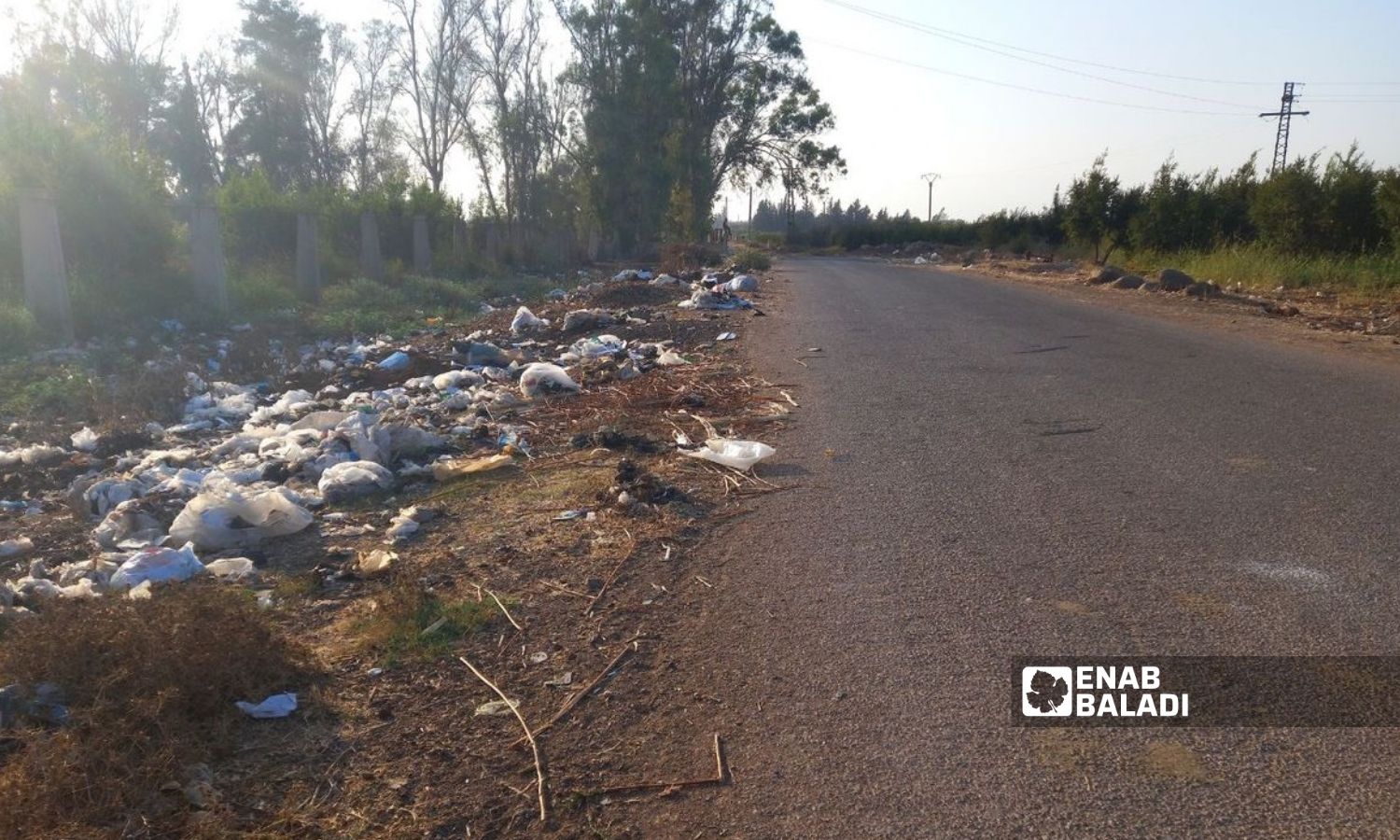



Daraa – Halim Muhammad
As local councils and municipalities elections near in the southern Daraa governorate, local residents eye the 18 September elections with low expectations.
The last mandate of the local councils, after the regime took control of Daraa governorate in July 2018, did not witness any improvement in the provision of services related to their duties and tasks, such as solving the problems of garbage accumulation on the sides of roads, bumps and potholes in the streets, street lighting and others.
The retreat of the local councils from their role prompted some areas in Daraa to collect local donations in order to maintain some facilities and improve the service reality.
The lack of financial provisions is the first and most frequent response by municipality officials in several areas of the southern region, following the residents’ demands to improve services on public streets, according to Enab Baladi’s interview with a number of the governorate’s residents.
Umm Ahmed, 45, of Dael, told Enab Baladi that the town’s notables have asked the municipality more than once to assume its responsibilities in implementing services, but its response was, “There is no financial provision for the municipality.”
The woman in her forties considered that one of the basics of the work of municipalities is the removal of garbage in the first place, but the municipalities are unable to secure appropriate wages for workers who receive their wages from the residents.
Hassan Mohammad, 30, who lives in the al-Lajat area, told Enab Baladi that the municipalities did not provide any services to al-Lajat, adding that the officials’ response to the notables in response to demands to improve services was always related to the lack of funds that hinders their work.
Residents fear the spread of infectious diseases resulting from the decomposition of waste as a result of the spread of garbage in most of the rural areas of Daraa for years without solutions.
Abdel Rahman, 45, of Tal Shihab town in the western countryside of Daraa, told Enab Baladi that the large spread of garbage results in unpleasant odors that affect the health of the residents, adding that the “argument of the municipalities” about not removing it was either the disruption of the garbage vehicle (tractor) or the lack of diesel fuel to operate it.
The town of Tal Shihab, which was one of the most beautiful tourist destinations in Daraa, is now without road services, such as street lighting, road paving, and others, Abdul Rahman complains.
Relying mainly on financial blocks provided by the residents of the area themselves in the form of donations, many municipalities of the eastern countryside of Daraa governorate have provided local services to the region during the current year, including taking care of garbage removal and paving roads.
Abu Mohammad, 50, of al-Musayfirah town, told Enab Baladi that the services in the municipalities of Giza, Saida, and al-Ghariya al-Sharqiya are made at the expense of local and expatriate donors.
For his part, Mohammad al-Mafaalani, 28, based in the eastern countryside of Daraa, considered that the services, which depended on donations, are considered incomplete services according to the financial ability of the people.
With funding from the residents, the municipalities paved several roads in 2022 in Nahata and al-Maliha al-Gharbiyeh, in addition to removing garbage from the areas.
He said that the residents collected 1.5 million SYP (about 400 USD) to maintain the tractor of the cleaning workshops.
Mahmoud, 50, of Saida, told Enab Baladi that the municipality carried out service works in the town at the residents’ expense and with the support of expatriates. It also restored some schools, paved roads, maintained electricity networks, and repaired drinking water wells.
Regarding the fundraising mechanism, Mahmoud (withheld his full name for security reasons) said that the funds are supervised by the mayor, who in turn directs the implementation of these works.
The donation campaigns were launched when the residents felt the inability of the regime’s institutions to carry out rehabilitation and local services after taking control of the governorate in July 2018.
The donations are voluntary and depend mainly on expatriates and the financially able, Mahmoud says.
Mahmoud indicated that the donations come at the request of notable people or to carry out a necessary service needed in the towns.
The notables launch appeals for donations in each town, and they also form a committee of the people charged with supervising the collection of these donations.
According to Mahmoud, the municipalities consider such local initiatives as an “achievement” for the governorate council, although the fund is provided by the residents.
With regard to the service situation, the Daraa governorate council focuses on supporting the towns’ municipalities with financial allocations, mechanisms, and continuous health monitoring, which is missing from the suburbs of Daraa, as well as the governorate’s countryside.
Daraa’s city center is witnessing cleaning campaigns, periodic maintenance of public facilities, and removing the ruins of the security barriers that withdrew from the city at the end of 2021.
On 17 August, the press office of the local council published images of the cleaning work in the city’s neighborhoods.
Meanwhile, Daraa suburbs and its countryside are witnessing neglect by the local councils.
On 18 August, the state-run al-Thawra newspaper reported an appeal from the suburbs residents calling that the cleaning work not be restricted to the city center, and its neighborhoods since the unpleasant smell resulting from the piles of waste disturbs the suburbs as well.
if you think the article contain wrong information or you have additional details Send Correction